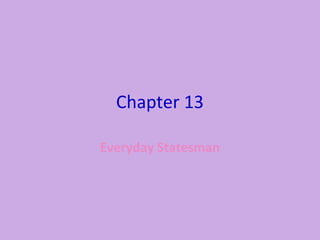
Chapter 13 everyday stateman
- 2. Focus In this presentation you will learn about the types of citizens, the path for a successful political career and the role of the Senate. Key Terms Patrician, Plebeian, Equites Cursus Honorum: Quaestor, Aedile, Praetor, Consul
- 3. SPQR Citizens Patricians Plebeians Nobles Equites (Knights) Non Citizens • Women • Slaves • Foreigners Citizens were given the right to vote and the duty of military service.
- 4. Citizens Patricians The wealthiest class from established families Plebeians • Everyone else! EQUITES Wealthy plebeians Originated from the cavalry businessmen Must have property worth 400,000 sesterces NOBLES A Later title used to distinguish the rich from the poor Included the Patricians and the Equites
- 5. Cursus Honorum • Questor • **Aedile • *Praetor • *Consul *curule magistrates which meant they were able to sit in a special chair sella curulis which was an ivory folding stool **Only the 2 patrician aediles were curule Curule
- 6. Quaestor sought at the ages of 27-30 Term = 1 year There were several Quaestors with the number increasing along with the size of the empire Usually sought often 10 years in the military and having been a military or plebeian tribune Was the “Treasurer” Collected the taxes and oversaw expenditures
- 7. Aedile • sought 2 years after Questor • Term = 1 year • Originally were 2 plebeians but 2 patricians were added • Oversaw public works including public buildings(like temples), roads, markets, the grain dole and games • An optional but favorable office since it allowed the person to win support through providing lavish games.
- 8. Praetor sought 2 years after Aedile were in their 30’s Term = 1 year Had ‘imperium’ or supreme authority, including the ability to apply/execute the death penalty 2 types: praetor urbanus; praetor peregrinus Number of Praetors grew along with empire Were the supreme civil judges Urbanus: oversaw suits between citizens Peregrinus: oversaw suits involving foreigners Propraetor served in a province ‘in place of' the praetor
- 9. Consul • sought 2 years after Praetor • were at least 42 • Term = 1 year • Had ‘imperium’ or supreme authority, including the ability to apply/execute the death penalty • Re-election only after 10 years • There were 2 so that no one man could have all the power • Were military commanders • Presided over the senate • Proconsul served in a province ‘in place of' the consul Lucius Junius Brutus the 1st consul
- 10. Tribunes • Military Tribune – Elected by his legion – Sought after a minimum of 5 years of service • Plebeian Tribune aka: Tribune of the plebs – Elected by the Concilium Plebis – Protected the plebeians – Held the power of veto and could stop legislation or the games or anything else that might oppress a plebeian.
- 11. Dictator • was appointed only in time of emergency • had supreme control and imperium • was a 6 month term • the other magistrates remained in office but the dictator had the ultimate power to lead the army and decide judicial matters • Cincinnatus was an ideal dictator who called upon in a time of crisis, lead Rome to safety and then willingly gave up the power to go back to work on his farm Statue of Cincinatus in Ohio
- 12. Censors • Censor – Only used in times of the census (every 5 years) – Appointed by comitia centuriata from former consuls – determined a citizen’s status (patrician, pleb, etc)
- 13. Roman Assemblies • Senate • Comitia Curiata • Comitia Centuriata • Comitia Tributa • Concilium Plebis
- 14. Senate • Members: 100, 300, 600 (80BC), 900 (reform of Julius Caesar) • Not elected; entry was given for holding a high office (one on the cursus honorm) or birth and for having property worth 1,000,000 sesterces • Served as advisors to magistrates • Made decrees not laws • Sent “bills” to various comitia for voting • Expelled only for misconduct
- 15. Comitia Curiata Based on the Curiae which was the organization of the original 3 tribes Important earlier on in Rome’s History Met only formally on occasion to bestow imperium on consuls and praetors
- 16. Comitia Centuriata Based on the centuries (voting units) Admission to unit was based on your ability to provide equipment for military service The wealthier centuries had more votes Decided on military matters (war and peace) Elected Praetors and Consul Heard appeals of capital cases (death penalty) Met on the Campus Martius
- 17. Comitia Tributa • Based on 35 tribes • Decided on bills sent by magistrates • Elected Quaestors and Aediles • Heard appeals of non-capital cases • Met in the Roman Forum (pictured below)
- 18. Concilium Plebis • Based on 35 tribes • Plebeians Only! • Elected Plebeian Tribunes and Aediles • after 287BC its resolutions became laws for all known as plebiscita • Met in the Roman forum (pictured below)
- 19. Assignment Now you will need to give a campaign speech of your own. You will need to give a speech in the voice board. This is like a discussion board but it allows you the record your post and response. You can also type your post. Your speech should include: •An introduction of your self •What office you are seeking •What experience/previous positions held •What you will do for Rome, given the parameters of the office you are seeking •Don’t forget “vote” by responding to a classmate’s post. You would want to state why you are voting (or not) for the person...based on their speech.